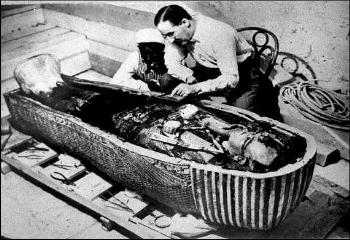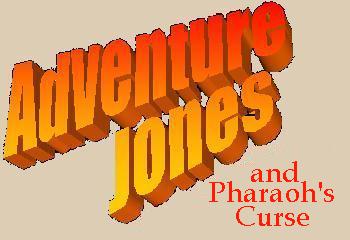Allegedly inscribed on Tutankhamen' s's tomb. Covered up by Carter to keep from scaring the locals. But the deaths and mysterious occurrences following the opening of the tomb could not be hidden and the mummies curse became as legendary as the relics found in his tomb.
We all remember from our history classes the wonderful things found in King Tutankhamen' s's's tomb on November 26, 1922. When Howard Carter and his wealthy companion Lord Carnarvon opened the tomb of king Tutankhamen's and some of the mystery around ancient Egypt began to fade. But, a more mysterious chain of events resulted in the opening of the grave.
The day Carter first peered through the darkness and into the tomb was glorious. When asked if he saw anything by impatient onlookers he could hardly spit out the words, "yes, wonderful things." But, the wonders were just the beginning. Unconfirmed reports state that when the excavation party left the tomb as the last man left a sad storm sprung up and swirled over the mouth of the tomb. As the storm subsided a hawk, the royal emblem of ancient Egypt, was seen flying away from the tomb toward the west and the mysterious "Other World." The superstitious believed the hawk to be the spirit of the dead pharaoh leaving his curse on the intruders. Few who read on would disagree.
Five months later, around March 6 Lord Carnarvon was bitten on the cheek by a mosquito. He later infected the bite after cutting it while shaving. Carnarvon traveled to Cairo to seek treatment a week later he was running a high fever and suffering from blood poisoning. Weakened he contracted pneumonia. As he died at 1:55 am the Daily Express reported that there was a power failure in Cairo. Suddenly all of the electric lights in the hospital went out leaving them all in complete darkness. The lights came back on momentarily and then went out again. Many believed this to be a horrible omen of evil.
At the same time back home Lord Carnarvon's beloved pet dog howled once and dropped dead mysteriously.
All of this seemed to point to the occult. Sir Arthur Conan Doyle, creator of Sherlock Holmes and leader of the spiritualist movement stated publicly that he was certain this was the work of black magic. Two psychics revealed that they had tried to warn Carnarvon against entering the tomb.
Predictions of Doom
The palmist Velma stated that Carnarvon had consulted him before leaving for Luxor. Velma was concerned by a large spot on the lifeline of Carnarvon's had and warned him that danger would follow.
In his memoirs the charming Cheiro exclaimed that while under the influence of the spirit of Princess Makitation, 7th daughter of Pharaoh Akhnaton he delievered an urgent warning to Carnarvon:
It was to the effect that on his arrival at the tomb of Tut-Ankh-Amen he was not to allow any of the relics found in it to be removed or taken away. The ending of the message was "that if he discovered the warning he would suffer injury while in the tomb- a sickness from which he would never recover, and that death would claim him in Egypt."
Fears escalated, heightened when Tutankhamen's mummy was examined. Doctors found a scab-like depression on the mummies left cheek corresponding with Carnarvon's mosquito bite.
Unexplainable death's followed Carnarvon's all attributed to the curse. Carnarvon's half brother Aubrey Herbert died of peritonitis. An Egyptian prince, Ali-Farney Bey, claimed descendant of the pharaohs was murdered in a London Hotel and his brother committed subside. American railway tycoon, George Jay Gould, died shortly after entering the tomb. Richard Bethell assisted Ca rater in cataloging the treasures found in the tomb. He committed subside at the age of 49. Shortly after, Bethell's father Lord Westbury, hurled himself to death from his apartment window. An alabaster vase taken from the tomb was in his room.
Seven years after the tomb had been opened a dozen people connected with it had died. Cause of death, the curse of Pharaoh.
In September 1924 Dr. Evelyn White an egyptologist at Leeds University took his life in a taxicab. He left this note:
" I know there is a curse on me, although I had leave to take those manuscripts to Cairo. The monks told me the curse would work all the same. Now it has done."
Still the curse did not stop there. In 1972, Egypts Director General of Antiquities, Dr. Gamal Mokhtar, died as Tutankhamen's possessions were moved to England for exhibition.
In 1978, the London News of the World detailed the disaster that followed the crew of airplane transporting the precious cargo. A fascinating list of heart attacks, serious injuries and tragedies.
Even now it is believed that if you study the relics too long the curse will strike you down. In 1992, historian Christopher Frayling presented a series for BBC about the impact Tutankhamen's discovery had, had on western civilization. He made a list of strange coincidences that could have ended in disaster while making this special.
The lights abruptly going out when I first mentioned the curse while standing over Tutankhamen's glass-topped sarcophagus deep with in the tomb itself; the sound packing up for no apparent reason, when I started my commentary next to the gold portrait mask of the Pharaoh in the Egyptian museum a sudden trouble with gallstones (the illness Howard Carter suffered from in the early 1920's) midway through the shoot; the snapping of the main cable holding up the elevator in the Cairo hotel where we were staying and it's dramatic fall for twenty-one floors with the director and the presenter still in the elevator; a very nasty respiratory attack ... virtually the entire crew getting conjunctivitis after we had filmed a night-time sequence in the Valley of the Queens about [Weigall's Attempt] to raise the ghost of Akhenaton.
Did the excavators commit an unforgivable crime by removing the precious possessions of the dead pharaoh? Was this crime punished with death or madness? The Curse of the Pharaoh remains a Fascinating Mystery.






